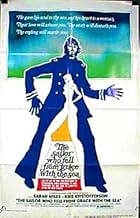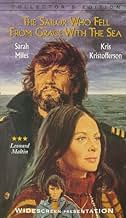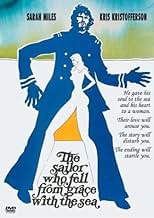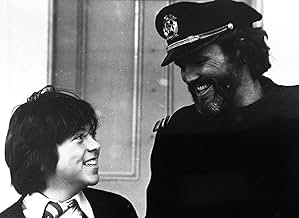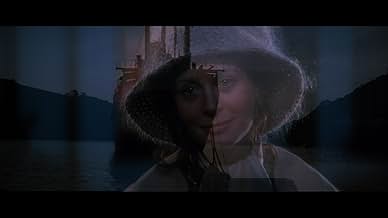Le marin qui abandonna la mer
Titre original : The Sailor Who Fell from Grace with the Sea
NOTE IMDb
6,2/10
1,8 k
MA NOTE
Ajouter une intrigue dans votre langueAfter his father dies, a disturbed young boy plots to take revenge on the new man in his mother's life.After his father dies, a disturbed young boy plots to take revenge on the new man in his mother's life.After his father dies, a disturbed young boy plots to take revenge on the new man in his mother's life.
- Réalisation
- Scénario
- Casting principal
- Récompenses
- 2 nominations au total
Charles Adey-Grey
- Man in Tea Room
- (non crédité)
Mabel Etherington
- Woman in Tea Room
- (non crédité)
Juba Kennerley
- Man in Tea Room
- (non crédité)
Avis à la une
A spooky 'erotic' romantic thriller, with undertones and imagery of both THE INNOCENTS and LORD OF THE FLIES and even RYANS DAUGHTER this film had a bit of a notorious reputation in the late 70s because of the peephole sex scenes and the all too graphic mutilation of the family cat. Plenty of seniors went stampeding from the cinemas gasping especially after the cat got the chop, hissing and howling. The sight of Sarah Miles masturbating gave a us all a kooky preview to WHITE MISCHIEF made ten years later. There has been plenty of criticism about the translation of this Japanese novel into the foggy coast of Dover, but really it does not matter because the almost MOONSPINNERS-like spooky seaside look adds to what is genuinely an usual and compelling romantic drama with deeply strange and uneasy subplot about the wrath of destructive misguided young boys. Kris Kristofferson was every woman's preferred seaman in the 70s! Then Babs snared him in her horrible remake of A STAR IS BORN. SAILOR was a big hit in its day and deserves another look. It is eerie and romantic and quite dangerous. You almost expect Sarah Miles to narrate (all REBECCA-like) "last night I dreamed I went to masturbate...." I saw it on a double with CABARET. Those were the days!
This is a British drama from 1976 about a shy and lonely widow Anne (Sarah Miles) raising up her 13-year-old son in a small English seaside city. When she meets the American sailor Jim (Kris Kristofferson), she falls in love with him and wants to marry him. Her son, being a member of a fascist secret circle led by the charismatic pupil "Chief", doesn't agree with that liaison and uses his radical friends against his possible stepfather...
The German title of this brilliant movie was called "Der Weg allen Fleisches" which means as much as "The way of all flesh". This is a suitable title as love, loneliness, seduction, longings and sex are integral elements of the story.
The director uses surreal scenes to support the emotional side of the movie. There is a beautifully shot sex scenes between Anne and Jim, and an outstanding masturbation scene of Anne in front of a mirror, secretly watched by her son. There are strange dream sequences, spiritual moods of the sea and a cruel scene where the gang's leader rips off a dead cat to present his totalitarian theories to his worshippers by its testicles.
Sarah Miles ("Blow-up", "Venom"), Kris Kristofferson ("Pat Garrett and Billy the Kid", "Convoy") and also the children actors are doing a fine job here. The touching score was written by Johnny Mandel, and Kris Kristofferson added his chilling "Sea Dream Theme". This film is more than just a love drama but an outstanding and forgotten tale about love, sex and death at the seaside with great locations and a very strange ending. Watch it if you get the occasion to do so!
The German title of this brilliant movie was called "Der Weg allen Fleisches" which means as much as "The way of all flesh". This is a suitable title as love, loneliness, seduction, longings and sex are integral elements of the story.
The director uses surreal scenes to support the emotional side of the movie. There is a beautifully shot sex scenes between Anne and Jim, and an outstanding masturbation scene of Anne in front of a mirror, secretly watched by her son. There are strange dream sequences, spiritual moods of the sea and a cruel scene where the gang's leader rips off a dead cat to present his totalitarian theories to his worshippers by its testicles.
Sarah Miles ("Blow-up", "Venom"), Kris Kristofferson ("Pat Garrett and Billy the Kid", "Convoy") and also the children actors are doing a fine job here. The touching score was written by Johnny Mandel, and Kris Kristofferson added his chilling "Sea Dream Theme". This film is more than just a love drama but an outstanding and forgotten tale about love, sex and death at the seaside with great locations and a very strange ending. Watch it if you get the occasion to do so!
An unforgettable and profoundly disturbing story centered on a widow, Anne, and her only son, Jonathan, in a remote English seaside town. Jonathan belongs to a gang led by a precociously intelligent sociopath known only as Chief, who through sheer force of will and intellect, indoctrinates them with a quasi-Neitzchean philosophy of ultimate superiority and the non-existence of morality. When Kris Kristofferson's Captain Jim arrives in town, and strikes up a passionate relationship with the lonely Anne, Jonathan sees him as a heroic masculine prototype, removed from society and living a 'true' life on the open sea. But when the Captain decides to settle down and marry Anne, Jonathan takes it as an ultimate and unforgivable betrayal, and exacts a terrible revenge.
Based on the 1963 Mishima novel, "The Sailor Who Fell From Grace With The Sea" hints at many themes, from Jonathan's Oedipal obsession with spying on his mother's bedroom to his physical admiration of the Captain that verges on latent homosexuality. The atmosphere, masterfully created by veteran cinematographer Douglas Slocombe, is one of darkly brooding clouds, gray seas, and an air that constantly threatens rain. The (in)famous sex scenes are really not that explicit, and the casual violence exhibited by the children is far more shocking than any glimpse of breast or buttock.
The film, for all its brilliantly evocative atmosphere, excellent performances, and quietly brooding menace, is not without its flaws. The score is terrible, all mawkish piano and sickly clarinet. It is often overly intrusive and distracts from the overall sense of ripe stillness that director Carlino conjures throughout the film. But in general, the film is a remarkable experience, and one that any viewer is unlikely to forget quickly.
Based on the 1963 Mishima novel, "The Sailor Who Fell From Grace With The Sea" hints at many themes, from Jonathan's Oedipal obsession with spying on his mother's bedroom to his physical admiration of the Captain that verges on latent homosexuality. The atmosphere, masterfully created by veteran cinematographer Douglas Slocombe, is one of darkly brooding clouds, gray seas, and an air that constantly threatens rain. The (in)famous sex scenes are really not that explicit, and the casual violence exhibited by the children is far more shocking than any glimpse of breast or buttock.
The film, for all its brilliantly evocative atmosphere, excellent performances, and quietly brooding menace, is not without its flaws. The score is terrible, all mawkish piano and sickly clarinet. It is often overly intrusive and distracts from the overall sense of ripe stillness that director Carlino conjures throughout the film. But in general, the film is a remarkable experience, and one that any viewer is unlikely to forget quickly.
The script and direction meld into a strong movie. With charm and humor to spare, this film was among the top echelon of movies from 1976. The characters in this film have a lot of depth, and that makes all the difference. In the end, the audience gets a casserole of film elements and little of the satisfaction that comes from watching these types of movies. I guess if I was in a bad mood, this movie wouldn't be half as good, but I thought it to be enjoyable and would recommend it. This is a story about a place most people might not be able to conceive. It is a powerful film. Many scenes do not feel believable, but good performances help to enhance this story.
The movie is indeed an adaptation of a novel by Yukio Mishima. Just to clarify, the novel is not an obscure work. Mishima is amongst Japan's most famous writers and was nominated for the Nobel Prize for Literature three times. Also, the plot of the original Japanese story does not happen in a remote fishing village; it happens in Yokohama, which is one of Japan's largest cities. Lastly, it does not happen in feudal Japan, a fact that would be very evident had someone read the book.
Now that that's been said, I've watched the movie since I very much enjoyed the novel. While I agree with most comments concerning the movie itself, I actually very much enjoyed the ending. Not only would have supplying an ending would have been taking too much liberty, but also it allows the viewer to imagine what would happen. Furthermore, to challenge another commenter, this sort of ending does work in movies and was a common motif of films during this era. Some other notable movies with endings similar to this include Francis Ford Coppola's "The Conversation" and "Parallax View."
Now that that's been said, I've watched the movie since I very much enjoyed the novel. While I agree with most comments concerning the movie itself, I actually very much enjoyed the ending. Not only would have supplying an ending would have been taking too much liberty, but also it allows the viewer to imagine what would happen. Furthermore, to challenge another commenter, this sort of ending does work in movies and was a common motif of films during this era. Some other notable movies with endings similar to this include Francis Ford Coppola's "The Conversation" and "Parallax View."
Le saviez-vous
- AnecdotesFirst English language filmed adaptation of a novel by Japanese writer Yukio Mishima.
- Versions alternativesUS DVD version is cut. Sex scenes of Sarah Miles are tamed down in US version.
- ConnexionsReferenced in Fantasm Comes Again (1977)
Meilleurs choix
Connectez-vous pour évaluer et suivre la liste de favoris afin de recevoir des recommandations personnalisées
- How long is The Sailor Who Fell from Grace with the Sea?Alimenté par Alexa
Détails
- Date de sortie
- Pays d’origine
- Langue
- Aussi connu sous le nom de
- The Sailor Who Fell from Grace with the Sea
- Lieux de tournage
- Sociétés de production
- Voir plus de crédits d'entreprise sur IMDbPro
Contribuer à cette page
Suggérer une modification ou ajouter du contenu manquant

Lacune principale
By what name was Le marin qui abandonna la mer (1976) officially released in India in English?
Répondre

